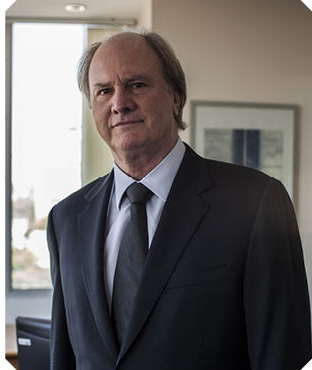GRI 102-14
In 2019, the Campo Limpo System faced great challenges, which were overcome thanks to the efforts of all links of the agricultural productive chain, which includes farmers, wholesalers/cooperatives and manufacturers, with the support of the government. We finished the year with impressive results!
For three years in a row, the volumes of disposed packaging material remained close to 43,000 tons. However, due to the increase in farmed areas, the use of technology and the presence of pests and diseases, the use of crop protection products rose in 2019 and, consequently, the return of post–consumption packages by producers also increased. Management of such growth required great effort on behalf of operations in receiving, logistics and eco–friendly final disposal. Of the initially expected 43,500 tons, the volume was revised and reached 45,300 tons by the end of 2019.

“A global reference in reverse logistics, the Campo Limpo System, besides its environmental benefits, boosts the economy and contributes in generating jobs and income.”
This was also a year in which the discussions around legislation required lots of effort, mainly in the fiscal and tax areas. The search for a new model to move packages more quickly and with less bureaucracy involved our entire team, and was supported by several external tax consultants. The result was very positive and we practically reached a new model that will be implemented in the future, thus bringing benefits to the System and consisting of a shift in paradigm. Still in the tax area, we presented a study to the Secretary of Finance and Planning of the State of São Paulo, demonstrating the need for incentive mechanisms for the recycling chain based on reverse logistics. Taking advantage of the discussion on Tax Reform taking place in the Federal Congress, we acted to raise awareness of congressmen regarding the incentives already provided by the National Policy on Solid Waste (PNRS – Política Nacional de Resíduos Sólidos). We believe they should be covered by the reform.
Also in the legislation area, the impact of the Shipping Rates Price List increased the costs of reverse logistics, the so–called “return shipment”. In order to find a solution, we met with the directors of the National Terrestrial Transportation Agency (ANTT – Agência Nacional de Transportes Terrestres) and participated in various forums and meetings promoted by the organization.
Seeking to optimize the management of the Campo Limpo System as well as gain efficiency, productivity and reduce costs, the Board of Directors attempted, within a systemic vision, to assess a model of centralized management of the central receiving units. After four years of analyses, counting with the participation of members of the Board and its associates – manufacturers and entities that represent all links of the agricultural chain, such as the Brazilian Agribusiness Association (Abag – Associação Brasileira do Agronegócio), the Brazilian Association of Generic Crop Protection (Aenda – Associação Brasileira dos Defensivos Genéricos), the National Association of Plant Protection – (Andef – Associação Nacional de Defesa Vegetal), the National Association of Veterinary and Agricultural Input Distributors (Andav – Associação Nacional dos Distribuidores de Insumos Agrícolas e Veterinários), the Organization of Brazilian Cooperatives (OCB – Organização das Cooperativas Brasileiras) and the National Union of the Industry of Crop Protection Products (SINDIVEG – Sindicato Nacional da Indústria de Produtos para Defesa Vegetal) – we arrived at the conclusion that inpEV should establish a plan to take on management of these units. The benefits of integrated management became evident to all. Besides optimizing and leveraging productivity, integrated management with standardized procedures would offer more safety, mitigate risks and allow distributors to focus more on their business, besides significantly reducing participation costs. All other actions in the areas of education, communication, support to receiving outposts and itinerant collection stations continue being done in a joint fashion.
In the pursuit of the challenge set forth in our vision of having a System that is self–sufficient, in 2019 we generated resources that correspond to more than 60% of the Campo Limpo System cost. Our objective is to eliminate the costs of all involved actors.
The Campo Limpo System – inpEV is an example of circular economy. We can assure that the System, based on all investments made in its operations, the value generated by recyclers, the jobs created and the involvement of third parties generated around R$ 450 million in 2019. Besides this, in environmental terms, it contributed to avoid the emission of greenhouse effect gases.
We also celebrated recognition from society. The Environmental Educational Program of Campo Limpo (PEA) was acknowledged by the United Nations Department of Economic and Social Affairs (UN DESA) as a good practice in disseminating the Sustainable Development Objectives (SDO) for the 240,000 children that participated in the program in 2019. A PEA milestone was the beginning of its implementation in municipal schools in the city of São Paulo. Besides this, we became part of the Rede Brasil of the Global Compact, an important global agenda for sustainable development, and the State Program for Climate Changes of the State of São Paulo (Proclima), in which the Campo Limpo System was highlighted as a successful example to face climate changes.
The Campo Limpo System – a Brazilian program of reverse logistics of empty packages or those containing post–consumption crop protection products – continues to be a global reference. We have received visits from various countries to learn about our program. Besides going to China to share the experience of Brazil, we have received a Chinese mission at inpEV in December. The interest in our System is great, and they have already shown interest in learning with us.
I finish this message as I have started it, by congratulating all links that have contributed to continuously improve the Campo Limpo System: a reason of pride for society and, especially, for Brazilian agriculture.
João Cesar M. Rando
inpEV CEO